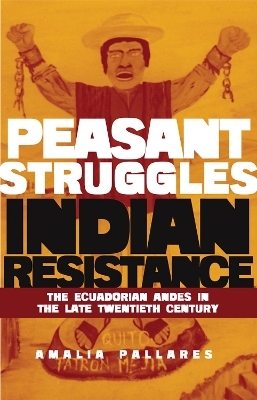
From Peasant Struggles to Indian Resistance
The Ecuadorian Andes in the Late Twentieth Century
Seiten
2024
University of Oklahoma Press (Verlag)
978-0-8061-9492-9 (ISBN)
University of Oklahoma Press (Verlag)
978-0-8061-9492-9 (ISBN)
Drawing on extensive research in her native Ecuador, Amalia Pallares examines the South American Indian movement in the Ecuadorian Andes and explains its shift from class politics to racial politics in the late twentieth century. Pallares explores why indigenous Ecuadorians have favored a political identity based on their ethnicity as Indians.
Drawing on extensive research in her native Ecuador, Amalia Pallares examines the South American Indian movement in the Ecuadorian Andes and explains its shift from class politics to racial politics in the late twentieth century. Pallares uses an interdisciplinary approach to explore the reasons why indigenous Ecuadorians have bypassed their shared class status with other peasant groups and movements in favor of a political identity based on their unique ethnicity as Indians.In the 1960s and 1970s, land reform and the modernization of economic and political structures in Ecuador led to changes in the sense of self and community held by South American Indian activists. Pallares recounts how a campesinista (peasant-based) identification developed into an indianista (Indian-based) form of personal and communal self-definition. Ethnic identity was no longer conceived as a subset of class identity--a change that shifted the Indians' ideological focus from local struggles to pan-ethnic resistance.
In the process, indigenous peoples created a positive Indian self-definition and a pan-ethnic Indian movement. They also reconceived their political identity, their cultural structures, and the relationship between their social movement and the state. Through this new sense of themselves, they sought to confront racism and obtain political autonomy.
Drawing on extensive research in her native Ecuador, Amalia Pallares examines the South American Indian movement in the Ecuadorian Andes and explains its shift from class politics to racial politics in the late twentieth century. Pallares uses an interdisciplinary approach to explore the reasons why indigenous Ecuadorians have bypassed their shared class status with other peasant groups and movements in favor of a political identity based on their unique ethnicity as Indians.In the 1960s and 1970s, land reform and the modernization of economic and political structures in Ecuador led to changes in the sense of self and community held by South American Indian activists. Pallares recounts how a campesinista (peasant-based) identification developed into an indianista (Indian-based) form of personal and communal self-definition. Ethnic identity was no longer conceived as a subset of class identity--a change that shifted the Indians' ideological focus from local struggles to pan-ethnic resistance.
In the process, indigenous peoples created a positive Indian self-definition and a pan-ethnic Indian movement. They also reconceived their political identity, their cultural structures, and the relationship between their social movement and the state. Through this new sense of themselves, they sought to confront racism and obtain political autonomy.
Amalia Pallares is Assistant Professor of Latin American and Latino Studies and Political Science at the University of Illinois in Chicago.
| Erscheinungsdatum | 02.10.2024 |
|---|---|
| Zusatzinfo | 5 figures |
| Verlagsort | Oklahoma |
| Sprache | englisch |
| Maße | 152 x 229 mm |
| Gewicht | 597 g |
| Themenwelt | Geschichte ► Allgemeine Geschichte ► Zeitgeschichte |
| Geisteswissenschaften ► Geschichte ► Regional- / Ländergeschichte | |
| Sozialwissenschaften ► Ethnologie | |
| Sozialwissenschaften ► Soziologie | |
| ISBN-10 | 0-8061-9492-8 / 0806194928 |
| ISBN-13 | 978-0-8061-9492-9 / 9780806194929 |
| Zustand | Neuware |
| Haben Sie eine Frage zum Produkt? |
Mehr entdecken
aus dem Bereich
aus dem Bereich
Gewalt, Umwelt, Identität, Methode
Buch | Softcover (2024)
Spector Books OHG (Verlag)
36,00 €


